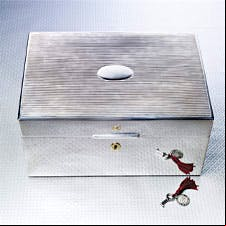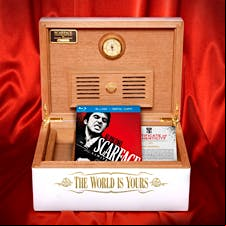Q&A: Talking Humidors With Daniel Marshall

Daniel Marshall has been making quality humidors for more than three decades. His humidors, which are built in the United States, have been rated at the top of Cigar Aficionado tests on a consistent basis, and he has built a reputation for quality. He also sells cigars under his name. In April, Marshall sat down with executive editor David Savona for a conversation about humidors.
SAVONA: How long have you been making humidors?
MARSHALL: 32 years. 1982 was my first year, and what a pleasure it has been. What an adventure and a journey.
Q: A humidor is, of course, much more than a box. Looking at one from the outside they are gorgeous, but there's a lot of function that has to go into it. What are some of the things that a humidor has to do? And what's difficult about making a proper humidor?
A: There is function, and there is beauty. And my goal, since day one, was to be able to do both. And there was a third element that was important, too, because I come from a lower middle-class family—it has to be affordable. My dream was to make affordable luxury. It wasn't a super high-expensive thing, diamond encrusted that no one could afford except for kings, princes and billionaires. I wanted to make something that people could aspire to collect and afford and that's what's happening.
Daniel Marshall Sterling Silver Humidor
|
First of all, you have the materials. You have to be absolutely neurotic about getting the most perfect Spanish cedar that is harvested in the forest at exactly the right window of the year. If you harvest it in the wrong time it will create sap that will never go away.
Q: So it has to be done at a certain time of year?
A: If you harvest at the wrong time, no matter how much you sand it, the sap just keeps coming out. There's no way to kiln-dry it—it's all about when you cut it down. Our cedar is from Brazil. That's critical.
Q: Did you learn that through trial and error?
A: We did grab some from other people and we had that problem. During that, we were so puzzled, we found out why. Of course you want a humidor that never moves. You want it as stable as possible.
Q: You're referring to the ts?
A: You don't want the seams to spread.
Q: That must be difficult with any box, but especially so with a humidor. It's 70 percent humidity inside the box, and perhaps 40 percent outside. There's a war going on.
A: Yes, an atmospheric war. Our goal is, of course, to replicate the climate of Nicaragua, Cuba, Dominican Republic. That's the idea. I'm a big believer that the aging of cigars should be between 65 percent and 70 percent humidity.
Q: So you're a believer in 65?
Danny Marshall limited-edition Scarface humidor
|
A: I like 65 not only for aging, but for smoking. There's nothing like taking a well-made cigar that has that perfect resistance, and you don't even draw on it—it just flows into your mouth. It's lighter than even your breath. I've smoked our cigars, where we've achieved that, Padrón cigars, Fuentes, some great Cubans. That's one of my goals. It's also a function of humidity—if it's more humid, it will be a tighter draw.
Hardware—you want a box that will stand the test of time. This humidor is an item that will be ed on generation to generation. In one way it's counter productive to build a business model on something that's going to be ed on forever, but I don't care. If it's not top quality, I'm not interested.
All gold plated, with many layers of gold, using mahogany that's kiln dried, so it can go from humid environments to non-humid environments. Our humidors are in every corner of the world.
Q: Are there some areas that are harder than others?
A: Arizona. Las Vegas. Singapore sometimes doesn't have air conditioning and it gets very humid.
Q: So it works both ways—if it's above 70 percent humidity?
A: You want to keep the humidity out. When Marlon Brando, my hero, he called us. My assistant said Marlon Brando is on the phone, he wants to buy a humidor. We talked on the phone. I said what do you need? He said, ‘Your biggest.' I said, ‘I'm a huge fan. Can I ask you why you are buying these humidors? I never knew you were a cigar smoker.' He said ‘I'm not a cigar smoker. I'm going to take these to Tahiti, put my scripts in there, and it will keep the humidity out.'
Q: That's fantastic. Where are your humidors made?
A: In the United States, in Santa Ana, California.
Q: I know you build humidors for a very good price, such as your Ambiente, but you have also made special humidors at the top of the spectrum, such as the one done in sterling silver. Can you talk about some of your more ornate projects?
A: There's nothing like a challenge. If you have clients—and there are people out there who want you to do something wild and crazy—it's fun to do. Like the one I did for Bijan, maybe 18 years ago. He said, ‘My best client is a Davidoff Cuban cigar smoker, and he wants a humidor that looks like the inside of his jet.' I had to lacquer it, all in pieces, put it together, and trays of macassar ebony all built to fit each size of the Cuban Davidoffs. There were drawers, and on the outside it was covered in alligator.
Q: What else to know about humidors?
A: The construction is important—you want it to never warp, the humidification system has to be right. It has to be very consistent. I'm fanatical about aging cigars. I think cigars become something more than a cigar with age. That's why we age our Red Label cigars for one year. I don't let them out. At events I do a comparison of an aged Daniel Marshall cigar vs. an unaged Daniel Marshall cigar. It doesn't matter that we use five-year-old tobacco—the age knocks off the rough edges.
Q: What percentage of cigar smokers, do you think, own a humidor?
A: Humidor—what is considered a humidor. Just a box? A humidor made in China? Or a quality humidor that will stand the test of time? Something that provides some element of shelter, I would guess 80 percent or less. I think many people don't realize how important a humidor is, and how important aging is.
This story first appeared in the May 5, 2015 issue of Cigar Insider.


















